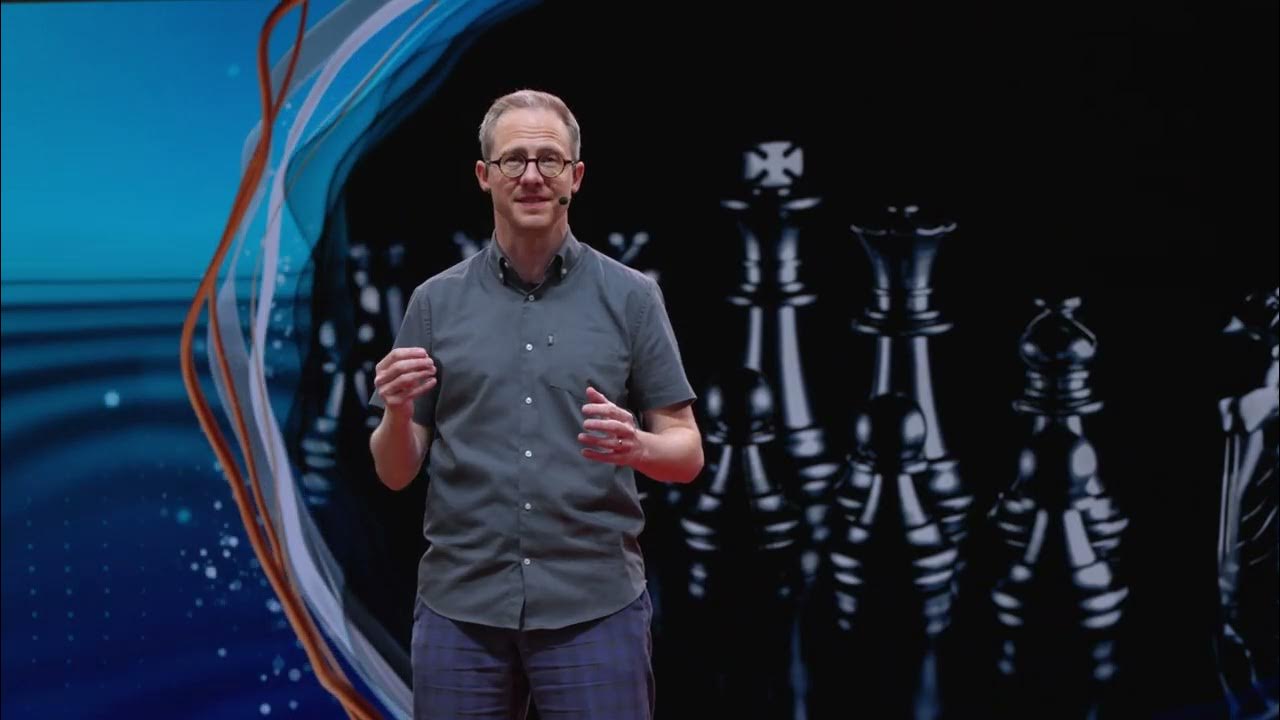A New Theory of Time - Lee Smolin
Summary
TLDRIn this thought-provoking discussion, the speaker challenges traditional views in physics and cosmology, proposing that time is not an illusion but an evolving aspect of the universe. They contrast two versions of naturalism: timeless naturalism, where laws are fixed, and temporal naturalism, which acknowledges that laws evolve with time. This shift has profound implications for society, particularly in how we address global issues like climate change and economics. The speaker emphasizes the importance of interdisciplinary collaboration, encouraging new perspectives from both the hard and social sciences to solve contemporary challenges.
Takeaways
- 😀 The debate between Timeless Naturalism and Temporal Naturalism is central to understanding how we view time in the universe, with the latter suggesting that laws of nature evolve over time.
- 😀 Lee Smolin challenges the idea that time is an illusion and argues that the experience of time as a flow of moments is real, contrary to popular interpretations in modern physics.
- 😀 The future is not fully determined; while physics can predict certain events, it cannot predict everything, and the future remains open to new possibilities.
- 😀 Embracing the reality of evolving laws of nature may inspire a sense of agency and hope in tackling global challenges like climate change and economic crises.
- 😀 The notion that everything, including natural laws, evolves over time offers a new perspective that could shift how we think about solving societal issues and personal challenges.
- 😀 Smolin proposes that the scientific community must recognize the limitations of applying small-scale laws of physics to large, complex systems, including the universe and social systems.
- 😀 The idea that everything in the universe, including the laws of nature, is subject to change challenges deterministic and static views that have dominated physics for centuries.
- 😀 The shift to Temporal Naturalism suggests that laws are not immutable, and that by understanding how they evolve, we might uncover deeper insights into both natural phenomena and human life.
- 😀 The scientific understanding of time and the evolution of natural laws has significant implications for economic policy, urging economists to reconsider past deterministic models when addressing modern economic challenges.
- 😀 Collaboration between disciplines, including physics, philosophy, and economics, is necessary to address the multifaceted problems humanity faces, as these fields can learn from each other to develop more effective solutions.
Q & A
What is the central theme of the speaker's argument in this discussion?
-The central theme is a critique of the view that time is an illusion and the laws of nature are immutable, proposing instead that the laws of nature evolve over time and that the present moment is real. This shift has broad implications for cosmology, human agency, and societal issues like climate change and economics.
What is the distinction between 'naturalism one' and 'naturalism two' as discussed in the transcript?
-'Naturalism one' (Timeless naturalism) suggests that the laws of nature are immutable and timeless, operating outside of time, whereas 'naturalism two' (Temporal naturalism) posits that laws of nature evolve with time and that the present moment is a key, real part of nature.
How does the speaker relate the debate on time to the concept of human agency?
-The speaker argues that if time is real and evolving, human agency is meaningful. If we accept a timeless universe, where the future is determined, it diminishes human agency. Embracing time's reality allows for the possibility of novelty and human imagination to shape the future, providing a sense of agency in addressing global challenges.
Why is the speaker critical of the view that time is an illusion?
-The speaker criticizes the view that time is an illusion because it leads to a fatalistic understanding of the universe, where everything is predetermined and humans have no agency. This perspective, if applied to societal issues, can lead to demoralization and inaction in the face of problems like climate change.
What role does the concept of 'novelty' play in the speaker's argument?
-The concept of novelty is central to the speaker's argument that the future is not predetermined. Novelty refers to the emergence of new possibilities, laws, and phenomena over time. If time evolves and is real, it allows for the existence of novel states of affairs that humans can influence, which is key to solving complex problems.
How does the speaker connect cosmology with practical problems like climate change?
-The speaker argues that the evolving nature of time, if embraced, can inspire hope and action in addressing complex problems like climate change. By acknowledging that the future is uncertain and open to change, humanity can use imagination and agency to navigate challenges, rather than succumb to fatalism.
What critique does the speaker offer regarding the use of physics in economics?
-The speaker critiques the use of outdated, timeless models of physics in economics. He argues that borrowing ideas about fixed, immutable laws from physics, particularly the notion of timeless truths, has led to misguided economic theories and policies that fail to account for the dynamic, evolving nature of economic systems.
What is the significance of 'path-dependency' in the context of both physics and economics?
-Path-dependency refers to the idea that past events shape future outcomes, which is crucial for both physics and economics. In physics, it suggests that laws may evolve based on previous events, while in economics, it challenges the assumption that past patterns will always predict future outcomes, urging for more adaptable models.
How does the speaker's view challenge traditional economic models?
-The speaker challenges traditional economic models that assume past trends will reliably predict future outcomes. Instead, by embracing the evolving nature of the universe and economics, the speaker advocates for models that account for change, uncertainty, and the potential for new phenomena to emerge in both economic systems and society.
What is the call to action in the conclusion of the discussion?
-The conclusion calls for interdisciplinary collaboration, where physicists and economists, among other disciplines, can learn from each other. The speaker suggests that by adopting a more dynamic and evolving view of the universe, societies can better address contemporary challenges like economic crises and climate change.
Outlines

This section is available to paid users only. Please upgrade to access this part.
Upgrade NowMindmap

This section is available to paid users only. Please upgrade to access this part.
Upgrade NowKeywords

This section is available to paid users only. Please upgrade to access this part.
Upgrade NowHighlights

This section is available to paid users only. Please upgrade to access this part.
Upgrade NowTranscripts

This section is available to paid users only. Please upgrade to access this part.
Upgrade NowBrowse More Related Video

Connecting quantum theory and general relativity | Lee Smolin

Why 'Past to Future' May Be a Myth?

¿Vivimos en un Multiverso? La teoría más interesante

Spoiler Alert: God Did Not Create the Universe

Is Addiction Healthy? Are We Getting It ALL WRONG?

Is there consciousness beyond the brain? | Philip Goff | TEDxNewEngland
5.0 / 5 (0 votes)